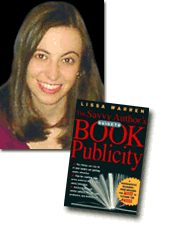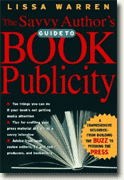 An Interview with
An Interview with
Lissa Warren
Interviewer Luan Gaines: What prompted you to put The Savvy Author’s Guide to Book Publicity together?
Lissa Warren: The book grew out of my desire to help authors—especially first-timers. They’re always so enthusiastic about the promotion process, and they always have so many questions—more than I can answer. I figured this would be a good way to get everything I know down in one place—for my authors, and for those who are publishing with other presses. An educated author pool benefits us all.
As a publicist, you have critical information for authors who need to understand the publicity machine and their role in the process. Overall, do you recommend a publicist over self-promotion?
If you self-published your book, you may well be your own best publicist. You’re highly motivated and determined—two traits that a good publicist would have. What’s more, you’ve already invested a pretty penny in your book and may not have the financial resources to hire a freelance publicist. Also, a freelance publicist may be hard for you to find, as most of them don’t take on self-published authors.
If you published with a regular house, you will probably be assigned a publicist and you should let that person do her job. That said, there are tons of ways you can help. And if you get indications that she’s not going to be able to deliver results for you, you may want to consider hiring a freelancer. But have an honest discussion with her about it first. She may even be able to recommend someone for you.
Finishing a manuscript is a huge accomplishment. How daunting is it for an author to learn that his work has just begun in promoting the book and how to you help him adjust to the process?
Some authors actually like the promotion process as much as—if not more than—the writing process. But for those who don’t, it can be exhausting to even start thinking about it. I try to give my authors a few “weeks off” between the time they turn in the final manuscript and the time we start gearing up for publicity. I find that sending them an author questionnaire that they can do at their leisure is a good way to get them thinking about what needs to be done and how they can help.
How does an author, especially a first-time author, select the right publicist and where does he look? Are there certain criteria?
Authors actually have very little say in who they get as an in-house publicist. The exception may be if they’ve published with that company before and want—or don’t want—the same person. If the author wants to hire a freelance publicist, he should start by looking in the LMP (Literary Market Place—available in the reference section of most libraries) or by asking writer friends who they’ve used. Chapter three of my book is also a good place to begin, as I list some of the best literary publicists—and their specialties—along with their websites so that you can check them out. Look for someone who has worked with reputable publishing companies—someone who has represented authors whose names (and book titles) you recognize. Also look for someone who has experience with your kind of book. If yours is a history title or a novel or a memoir, a freelance publicist with cookbook experience isn’t going to be as much help to you.
Without the behind-the-scenes help of a publicist, what are the chances of a book’s success in today’s competitive market?
It honestly depends on the book. Some books are publicity-driven, and some books aren’t. It’s possible that your book will be better served by a splashy ad campaign, or a lecture circuit, or simply by front-table placement in bookstores. But I would say that most books can benefit quite a bit from publicity. It certainly doesn’t hurt!
For me, the whole idea seems overwhelming, but the author anecdotes and personal observations are persuasive in understanding the challenges after a book is published. How critical is your personal interaction with a client in promoting a title?
It’s crucial. I feed off the energy of my authors. If they’re enthusiastic about promoting their book, chances are I will be too. They can also help me in other, more concrete ways. Their media contacts will be of use to me. Their ideas for event venues—bookstores, libraries, etc.—will be valuable. Their help with the press material may be appreciated. In the end, I may not agree that all of their suggestions make sense. But I do welcome them.
From a publicist’s perspective, how do you choose the clients you represent, considering the time and energy involved for both parties?
It depends on whether you’re an in-house publicist or a freelancer. If you’re in-house, you let the Publicity Director know which books you’re excited about—and then you hope they’re assigned to you. Most Publicity Directors try to honor these requests, but they have to take things like pub-dates, experience, and expectations into account. You’re not going to give your lead title to an entry-level publicist or a difficult author to someone who won’t be able to stand up to him or her.
If you’re a freelance publicist, you can certainly be choosy about which authors and books you take on, and you can base your decision on personal interest, to some extent. Almost all freelance publicists are careful never to take on a book for which they’re not confident they can get results. It leads to unhappy clients and a bad reputation—not to mention a lot of frustration.
Assuming a match has been made between author and publicist and is proceeding well, what is the most common problem or conflict that arises?
Hmm. That’s a tough one. One hurdle is communication. A publicist needs to be able to reach her author pretty much 24/7. You never know when a media opportunity will present itself, and there’s nothing worse than an AWOL author. It can also be a strain when a book just isn’t “working”—when, despite everyone’s best efforts, the media doesn’t bite and copies just don’t sell. But I think the hardest thing is managing expectations. When an author comes into the process thinking she’s going to be on “Oprah” or NPR’s “Fresh Air,” or confident that her book is New York Times Book Review material, she may well be setting herself up for disappointment…because those things are really difficult to get. For some books, it’s actually impossible because it’s simply not the kind of thing they “do.” When is the last time you saw a book on cat massage reviewed in the NYTBR?
 What do you enjoy most about being a publicist? What is the most difficult aspect?
What do you enjoy most about being a publicist? What is the most difficult aspect?
I love that I’m always learning—that I’m constantly being exposed to topics I would otherwise not encounter, I promoted a book on theoretical physics. I promoted a book on Pilates. I did one on being left-handed and one on Anne Boleyn. This fall, it’s the Rolling Stones, a history of Monopoly, a polemic on homework, a Fallujah chronicle, and a new edition of a parenting classic. And did I mention Allen Ginsberg’s boyhood journals and poems? I also adore many of my authors—smart, talented people who appreciate my efforts. Plus my colleagues are pretty amazing. I like being surrounded by others who like books.
The publicist sets up tours and the author must carry the ball from that point. Do the tours and other events cement the collaborative process as the author becomes an active part of his own publicity?
Oh, tours can be a bonding experience alright…especially when they go poorly! Every publicist has gotten that late-night call from an author who just traveled cross-country to speak to a room of seven people—two of whom left half-way through. But authors really can be a huge help when it comes to the tour. The best ones help us “put bodies in chairs”—meaning, weeks ahead of time they start getting the word out via family, friends, their website, alumni list-serves…you name it. Their efforts usually pay off—literally, because they sell more books.
What is the most critical element in pitching a book to the media? Any taboos?
My cardinal rule is “avoid hype.” Don’t just say a book is interesting—make it sound interesting. Another one is “know the show,” though it applies to print media too. Basically, it means educate yourself about the show or publication before approaching it. There’s nothing worse than pitching a phoner to shows that only have guests in studio, or suggesting a topic that they covered in depth the day before or simply wouldn’t do. It’s also important to build relationships with members of the press. And I’m not just talking wining and dining; I do very little of that, actually. It’s more about returning calls quickly and getting them materials on time—that sort of thing. Not glamorous, but responsive and solid.
Are there any inherent pitfalls in author interviews? How does an author decide which to do and which to refuse (if any)?
Every author has good interviews and bad interviews. Even when they’re really “on”—and not everyone can be “on” all the time—they can be derailed by unprepared or aggressive hosts, breaking news, absurd listener call-ins, a coughing fit, and just about anything else. I encourage my authors to roll with the punches, and do every half-way decent interview that I can get for them. Yes, it’s unlikely that your book will become a national bestseller because you were on “Bob’s Big Book Browse” on Boise’s WXYZ AM at 2:00 a.m. on Sundays…but you never know who may be listening and what it may lead to. Call me an eternal optimist…but that’s what publicists have to be, right?
What is the role of the internet in book publicity, including author interview, reviews, tangential articles, etc.? Has this market expanded significantly in the past few years?
When I started in publishing about a dozen years ago, we didn’t even have email—much less a website. Now, it’s not just the publishers who have a site—it’s the individual authors. And they don’t just have a site—they have a blog, an online book video (or at least an audio clip), and lots of other bells and whistles. They post their tour schedules, their reviews, and photos from their events. They link to other author sites, and to favorite bookstores.
And the Web is alive with book coverage. Salon, Slate, CNN, MSNBC.com, AOL, WebMD—they’re major sites, and they all cover books via reviews, chats, excerpts, and/or profile pieces. Because of the Web, the number of opportunities that exist for any given book has expanded exponentially. That makes the publicist’s job much easier…and much harder.
Other than the obvious sites, Barnes & Noble, Amazon.com, how does an author locate other sites where his book might merit a review? Is this kind of exposure worth the effort in sales?


